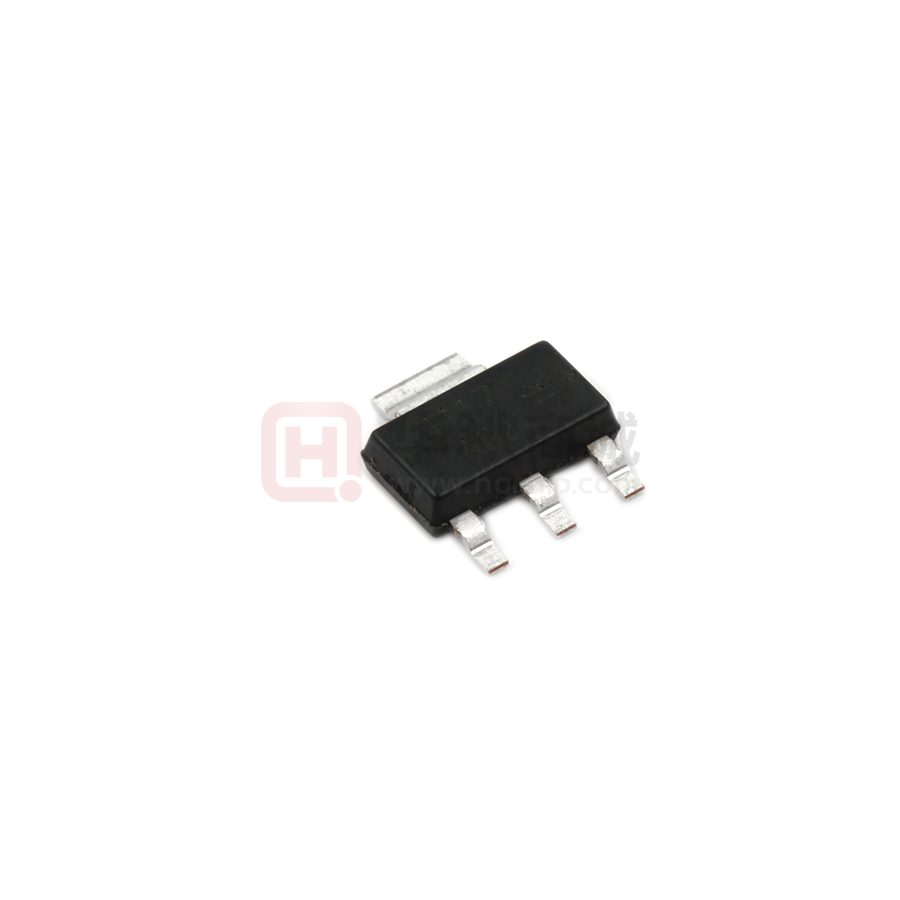AMS1117
1A Bipolar Linear Regulator
Features
Maximum output current is 1.4A
Standby current: 2mA (typ.)
Range of operation input voltage: Max 30V
Load regulation: 0.2%/A (typ.)
Line regulation: 0.03%/V (typ.)
Environment Temperature: -40℃~ 85℃
DVD Decode Board
ADSL Modem
Post Regulators For Switching Supplies
Applications
Power Management for Computer Mother
Board, Graphic Card
LCD Monitor and LCD TV
General Description
AMS1117 is a series of low dropout three-terminal
AMS1117 offers thermal shut down function, to assure the
regulators with a dropout of 1.3V at 1A load current.
stability of chip and power system. And it uses trimming
AMS1117 features a very low standby current 2mA
technique to guarantee output voltage accuracy within
compared to 5mA of competitor.
2%. Other output voltage accuracy can be customized on
Other than a fixed version, Vout = 1.2V, 1.8V, 2.5V, 2.85V,
demand, such as
3.3V, and 5V, AMS1117 has an adjustable version, which
AMS1117 is available in SOT-223 package.
1%.
can provide an output voltage from 1.25 to 12V with only
two external resistors.
Typical Application
AMS1117
Application circuit of AMS1117 fixed version
Typical Electrical Characteristic
REV.08
1 of 7
�1A Bipolar Linear Regulator
AMS1117
Block Diagram
Pin Configuration
Absolute Maximum Ratings
Max Input Voltage ······························································································································30V
Max Operating Junction Temperature(Tj) ··························································································150℃
Ambient Temperature(Ta) ·················································································································-40℃~ 85℃
Storage Temperature(Ts) ··················································································································-40℃~150℃
Lead Temperature & Time ·················································································································260℃ 10S
Caution: Exceed these limits to damage to the device. Exposure to absolute maximum rating conditions may affect
device reliability.
Recommended Work Conditions
Recommended maximum input voltage ··································································································
18V
Recommended operating junction temperature(Tj) ················································································
-20~125℃
Thermal Information
Parameter
Package
Package thermal
resistance
REV.08
Rating
Unit
20
℃/W
SOT-223
2 of 7
�1A Bipolar Linear Regulator
AMS1117
Electrical Characteristics
TA=25℃, unless otherwise noted.
Symbol
Parameter
Vref
Reference
voltage
Conditions
AMS1117 -Adj
Min
Typ
Max
Unit
1.225
1.25
1.275
V
1.176
1.2
1.224
V
1.764
1.8
1.836
V
2.45
2.5
2.55
V
2.793
2.85
2.907
V
3.234
3.3
3.366
V
4.9
5
5.1
V
0.03
0.2
%/V
0.03
0.2
%/V
0.03
0.2
%/V
0.03
0.2
%/V
0.03
0.2
%/V
0.03
0.2
%/V
0.03
0.2
%/V
2
8
mV
2
8
mV
3
12
mV
10mA≤Iout≤1A , Vin=3.25V
-1.2V
0≤Iout≤1A , Vin=3.2V
-1.8V
0≤Iout≤1A , Vin=3.8V
-2.5V
Vout
Output voltage
0≤Iout≤1A , Vin=4.5V
-2.85V
0≤Iout≤1A , Vin=4.85V
-3.3V
0≤Iout≤1A , Vin=5.3V
-5.0V
0≤Iout≤1A , Vin=7.0V
-1.2V
Iout=10mA, 2.7V≤Vin≤10V
-ADJ
Iout=10mA, 2.75V≤Vin≤12V
-1.8V
Iout=10mA, 3.3V≤Vin≤12V
△Vout
Line
regulation
-2.5V
Iout=10mA, 4.0V≤Vin≤12V
-2.85V
Iout=10mA, 4.35V≤Vin≤12V
-3.3V
Iout=10mA, 4.8V≤Vin≤12V
-5.0V
Iout=10mA, 6.5V≤Vin≤12V
-1.2V
Vin =2.7V, 10mA≤Iout≤1A
-ADJ
Vin =2.75V, 10mA≤Iout≤1A
-1.8V
Vin =3.3V, 10mA≤Iout≤1A
REV.08
3 of 7
�1A Bipolar Linear Regulator
△Vout
Load
AMS1117 -2.5V
AMS1117
4
16
mV
5
20
mV
6
24
mV
9
36
mV
Iout =100mA
1.15
1.3
V
Iout=1A
1.3
1.5
V
AMS1117-ADJ
2
10
mA
AMS1117 -1.2V,Vin=10V
2
5
mA
-1.8V,Vin=12V
2
5
mA
Quiescent
-2.5V,Vin=12V
2
5
mA
Current
-2.85V,Vin=12V
2
5
mA
-3.3V,Vin=12V
2
5
mA
-5.0V,Vin=12V
2
5
mA
55
120
uA
0.2
10
uA
regulation
Vin =4.0V, 10mA≤Iout≤1A
-2.85V
Vin =4.35V, 10mA≤Iout≤1A
-3.3
Vin =4.8V, 10mA≤Iout≤1A
-5.0
Vin =6.5V, 10mA≤Iout≤1A
Vdrop
Imin
Dropout voltage
Minimum load
current
Iq
IAdj
Adjust pin
current
Ichange
Iadj change
AMS1117 -ADJ
Vin=5V,10mA≤Iout≤1A
AMS1117-ADJ
Vin=5V,10mA≤Iout≤1A
ΔV/ΔT
Temperature
±100
ppm
20
℃/W
coefficien
θJC
Thermal
resistance
SOT-223
Note1: All test are conducted under ambient temperature 25°C and within a short period of time 20ms
Note2: Load current smaller than minimum load current of AMS1117-ADJ will lead to unstable or oscillation output.
REV.08
4 of 7
�1A Bipolar Linear Regulator
AMS1117
Detailed Description
AMS1117 is a series of low dropout voltage, three terminal regulators. Its application circuit is very simple: the fixed version
only needs two capacitors and the adjustable version only needs two resistors and two capacitors to work. It is composed
of some modules including start-up circuit, bias circuit, bandgap, thermal shutdown, power transistors and its driver circuit
and so on.
The thermal shut down modules can assure chip and its application system working safety when the junction temperature
is larger than 140°C.
The bandgap module provides stable reference voltage, whose temperature coefficient is compensated by careful design
considerations. The temperature coefficient is under 100 ppm/°C. And the accuracy of output voltage is guaranteed by
trimming technique.
Typical Application
AMS1117 has an adjustable version and six fixed versions (1.2V, 1.8V, 2.5V, 2.85V , 3.3V and 5V)
Fixed Output Voltage Version
Application circuit of AMS1117 fixed version
1)
Recommend using 10uF tan capacitor as bypass capacitor (C1) for all application circuit.
2)
Recommend using 10uF tan capacitor to assure circuit stability.
Adjustable Output Voltage Version
Application Circuit of AMS1117-ADJ
The output voltage of adjustable version follows the equation: Vout=1.25×(1+R2/R1)+IAdj×R2. We can ignore
IAdj because IAdj (about 50uA) is much less than the current of R1 (about 2~10mA).
1)
To meet the minimum load current (>10mA) requirement, R1 is recommended to be 125ohm or lower. As
AMS1117-ADJ can keep itself stable at load current about 2mA, R1 is not allowed to be higher than 625ohm.
REV.08
5 of 7
�1A Bipolar Linear Regulator
2)
AMS1117
Using a bypass capacitor (CADJ) between the ADJ pin and ground can improve ripple rejection.
This bypass
capacitor prevents ripple from being amplified as the output voltage is increased. The impedance of C ADJ should be less
than R1 to prevent ripple from being amplified. As R1 is normally in the range of
100Ω~500Ω, the value of C ADJ should
satisfy this equation: 1/(2π×fripple×CADJ)
